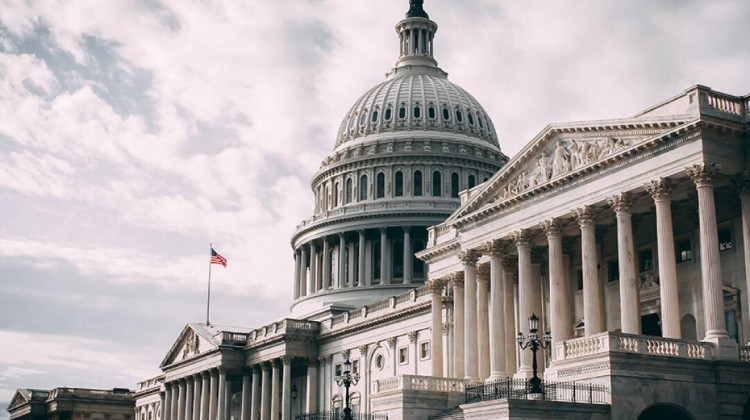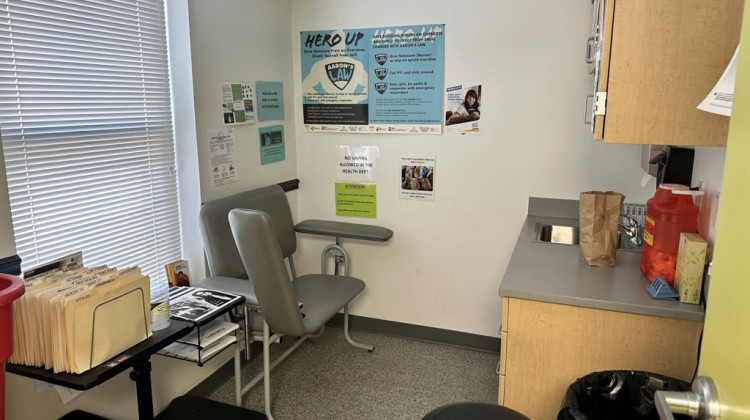
Two new studies offer further evidence that Medicaid, the public health insurance program for low income and disable people, saves lives.
Harold Mendoza / UnsplashHouse Republicans just released a bill that includes some deep cuts to Medicaid. Now, a new pair of academic studies offers further evidence that Medicaid saves lives. So, The Checkup's question is: What's at stake if these major Medicaid reforms make it through Congress?
Lizzy McGrevey, community engagement specialist with Side Effects Public Media, spoke with Leslie Walker, a producer with health policy news organization Tradeoffs.
This transcript has been edited for length, style and clarity.
Lizzy McGrevy: Congressional Republicans want to save taxpayer money by making major changes to Medicaid. Can you briefly walk us through what is even being proposed here?
Leslie Walker: Sure. So, the bill that just passed the House includes something like 20 different changes to Medicaid, many of them would make it harder to get on the program and to stay on it.
For example, one of the biggest changes requires adults under 65 with a few exceptions, to either work, volunteer or go to school at least 80 hours a month to qualify for Medicaid. By some estimates, all these reforms added together, would save the Feds about $800 billion over the next decade, but they would also lead to about seven and a half million people losing their Medicaid.
McGrevy: These changes may save hundreds of billions of dollars like you just mentioned, but there is new research that suggests that there are some pretty costly concerns here, right?
Walker: That's right. So, a working paper recently published by the nonpartisan National Bureau of Economic Research offers the strongest evidence we've seen to date that Medicaid coverage can save people's lives.
So that, of course, is raising some concerns and questions about what could happen if this bill becomes law and causes more than 7 million folks to lose this coverage.
The paper's authors looked at what happened after the Affordable Care Act passed allowing states to expand Medicaid to more people. Some states, of course, chose to expand their Medicaid programs. Others did not. Those that did, the researchers found, saved almost 25,000 lives between 2010 and 2022, and people who got this new Medicaid coverage were about 21% less likely to die than folks who did not.
McGrevy: So, when we're talking about these saved lives, are we primarily talking about older people who are more likely to get sick than say, like your healthy next door 27 year old neighbor?
Walker: Good question. So, one of the surprising things about this paper is it actually found that Medicaid doesn't just save the lives of sicker older folks, but young adults too. The researchers suspect that's because Medicaid gives more folks access to mental health care and substance use treatment.
McGrevy: And then there's this other paper about how Medicaid lowers prescription drug prices for some people. Can you talk us through that as well?
Walker: Yeah, so this other paper was published in the New England Journal of Medicine, and if the first paper we just talked about is measuring Medicaid value to kind of healthier, better off folks who got Medicaid under the ACA.
Then, this second paper is really about Medicaid value to kind of the most vulnerable, the worst off people on Medicaid. We're talking here about the 12 million folks who are enrolled in both Medicaid and Medicare. So, they're poor and either over 65 or disabled, sometimes all three.
The researchers looked at what happened when people in this group lost their Medicaid, and along with it, this kind of extra prescription drug subsidy that lowers their drug costs by several thousand dollars a year. The result of those losses is that nearly 3,000 people in this study died, and people relying on expensive drugs were the most likely to die.
McGrevy: These studies make the stakes of potentially cutting Medicaid very stark, but Republicans have said that reforms in their bill are necessary to clean up the waste and abuse that they say is rampant within this Medicaid program. What are the researchers saying about this?
Walker: Yeah, so it sounds like common sense that if you want to reduce fraud, you should add more steps for people to prove they're eligible for Medicaid, things like that work requirement.
But other research shows that red tape like that doesn't just catch ineligible people, it also ends up causing a bunch of eligible people to lose their Medicaid too. They mess up paperwork, miss a piece of mail, boom, they've lost their insurance.
What this second paper shows is just how deadly a mistake like that can be. Even facing higher drug costs for a couple extra months without Medicaid killed some people. and the question ultimately, for lawmakers, Harvard economist Amitabh Chandra said is whether this extra hassle is worth the harm it could cause.
"All of these ordeals might save us money, but it comes at a tremendous cost. And the cost here is lost human lives," Chandra said.
To learn more about Leslie Walker's reporting on Medicaid, you can listen to this podcast episode from Tradeoffs.
Tradeoffs is an editorial partner of Side Effects Public Media.
The Checkup by Side Effects Public Media is a regular audio segment on WFYI's daily podcast, WFYI News Now.
Side Effects Public Media is a health reporting collaboration based at WFYI in Indianapolis. We partner with NPR stations across the Midwest and surrounding areas — including KBIA and KCUR in Missouri, Iowa Public Radio, Ideastream in Ohio and WFPL in Kentucky.
 DONATE
DONATE






 Support WFYI. We can't do it without you.
Support WFYI. We can't do it without you.